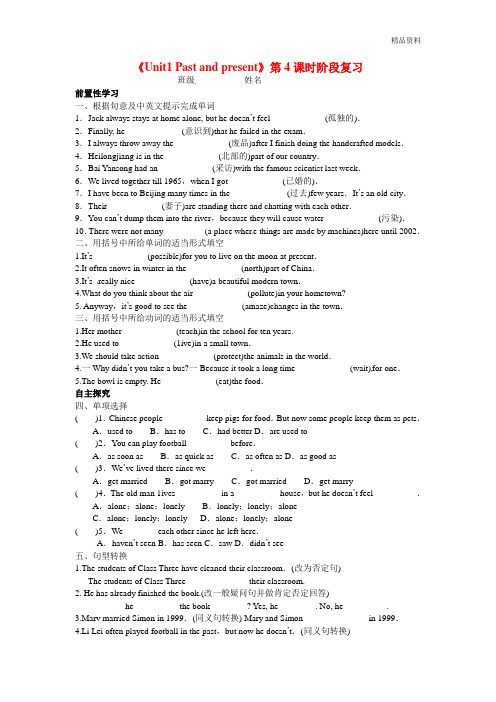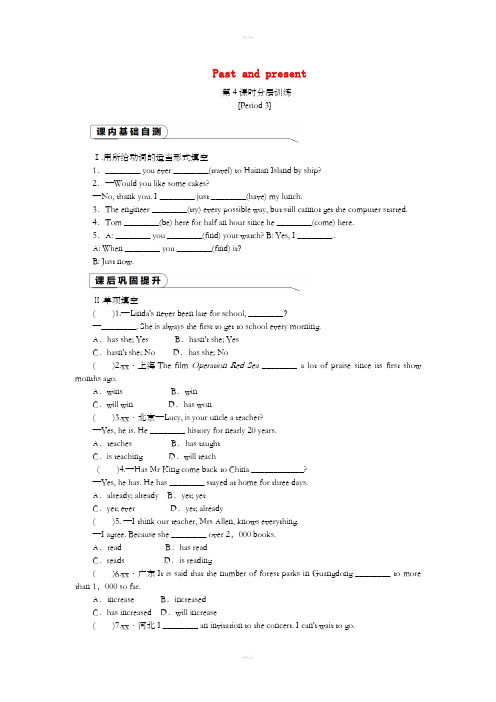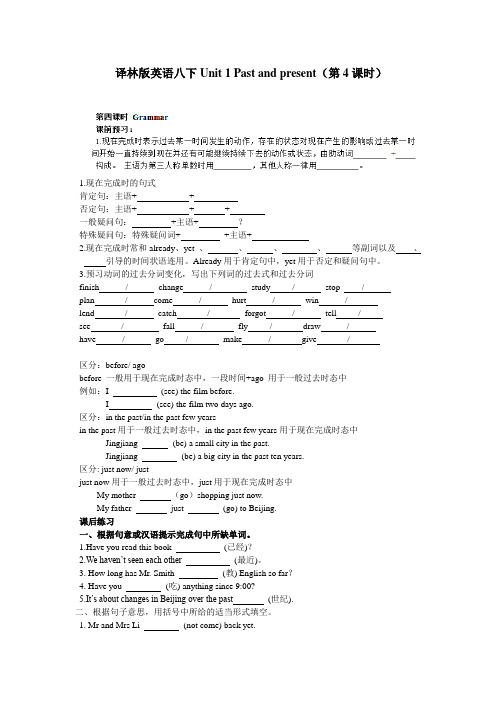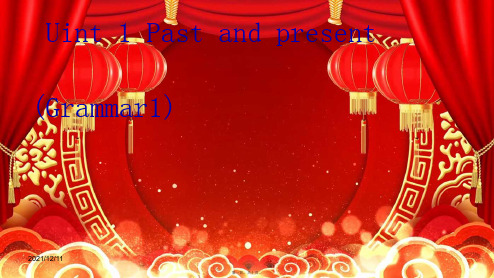八年级英语下册《Unit1 Past and Present》第4课时 Grammar预习案 (新版)牛津版(1)
- 格式:doc
- 大小:47.60 KB
- 文档页数:4


《Unit1 Past and present》第4课时阶段复习班级___________姓名_____________前置性学习一、根据旬意及中英文提示完成单词1.Jack always stays at home alone, but he doesn’t feel____________ (孤独的).2.Finally, he ____________ (意识到)that he failed in the exam.3.I always throw away the____________ (废品)after I finish doing the handcrafted models.4.Heilongjiang is in the____________ (北部的)part of our country.5.Bai Yansong had an____________ (采访)with the famous scientist last week.6.We lived together till 1965,when I got____________ (已婚的).7.I have been to Beijing many times in the ____________ (过去)few years.It’s an old city.8.Their____________ (妻子)are standing there and chatting with each other.9.You can’t dump them into the river,because they will cause water____________ (污染).10.There were not many_________ (a place wher e things are made by machines)here until 2002.二、用括号中所给单词的适当形式填空1.It’s____________ (possible)for you to live on the moon at present.2.It often snows in winter in the____________ (north)part of China.3.It’s really nice____________ (have)a beautiful modern town.4.What do you think about the air____________ (pollute)in your hometown?5. Anyway,it’s good to see the____________ (amaze)changes in the town.三、用括号中所给动词的适当形式填空1.Her mother____________ (teach)in the school for ten years.2.He used to____________ (1ive)in a small town.3.We should take action____________ (protect)the animals in the world.4.一Why didn’t you take a bus?一Because it took a long time____________ (wait)for one.5.The bowl is empty. He____________ (eat)the food.自主探究四、单项选择( )1.Chinese people__________keep pigs for food.But now some people keep them as pets.A.used to B.has to C.had better D.are used to( )2.You can play football__________before.A.as soon as B.as quick as C.as often as D.as good as( )3.We’ve lived there since we__________.A.get married B.got marry C.got married D.get marry( )4.The old man 1ives__________ in a__________ house,but he doesn’t feel__________.A.alone;alone;lonely B.lonely;lonely;aloneC.alone;lonely;lonely D.alone;lonely;alone( )5.We________each other since he left here.A.haven’t seen B.has seen C.saw D.didn’t see五、句型转换1.The students of Class Three have cleaned their classroom.(改为否定句)The students of Class Three_______ _______their classroom.2. He has already finished the book.(改一般疑问句并做肯定否定回答)________ he ________ the book ________? Yes, he ________. No, he ________.3.Marv married Simon in 1999.(同义句转换) Mary and Simon _______ _______in 1999.4.Li Lei often played football in the past,but now he doesn’t.(同义句转换)Li Lei _______ _______ _______ football.5.I’ve known him since he came here.(对划线部分提问)_____ ______ ______ you known him?6.You have done your homework, ________ you ?(改为反意疑问句)7.He has never been abroad, ________ he? (改为反意疑问句)六、根据中文提示完成句子1.这家老的电影院已经变成了一家大型超市。

Past and present第4课时分层训练[Period 3]Ⅰ.用所给动词的适当形式填空1.________ you ever ________(travel) to Hainan Island by ship?2.—Would you like some cakes?—No, thank you. I ________ just ________(have) my lunch.3.The engineer ________(try) every possible way, but still cannot get the computer started.4.Tom ________(be) here for half an hour since he ________(come) here.5.A: ________ you ________(find) your watch? B: Yes, I ________.A: When ________ you ________(find) it?B: Just now.Ⅱ.单项填空( )1.—Linda's never been late for school, ________?—________. She is always the first to get to school every morning.A.has she; Yes B.hasn't she; YesC.hasn't she; No D.has she; No( )2.xx·上海The film Operation Red Sea________ a lot of praise since its first show months ago.A.wins B.winC.will win D.has won( )3.xx·北京—Lucy, is your uncle a teacher?—Yes, he is. He ________ history for nearly 20 years.A.teaches B.has taughtC.is teaching D.will teach( )4.—Has Mr King come back to China ____________?—Yes, he has. He has ________ stayed at home for three days.A.already; already B.yet; yetC.yet; ever D.yet; already( )5. —I think our teacher, Mrs Allen, knows everything.—I agree. Because she ________ over 2,000 books.A.read B.has readC.reads D.is reading( )6.xx·广东It is said that the number of forest parks in Guangdong ________ to more than 1,000 so far.A.increase B.increasedC.has increased D.will increase( )7.xx·河北I ________ an invitation to the concert. I can't wait to go.A.receive B.will receiveC.was receiving D.have received( )8.—Where is your mother, Jack?—She ________ the library.A.has gone to B.have gone toC.have been to D.has been toⅢ.根据汉语意思完成句子1.近几年来,在我们地区,春天很快就变成了炎热的夏天。

译林版英语八下Unit 1 Past and present(第4课时)1.现在完成时的句式肯定句:主语+ +否定句:主语+ + +一般疑问句:+主语+ ?特殊疑问句:特殊疑问词+ +主语+2.现在完成时常和already、yet 、、、、等副词以及、引导的时间状语连用。
Already用于肯定句中,yet用于否定和疑问句中。
3.预习动词的过去分词变化,写出下列词的过去式和过去分词finish / change / study / stop /plan / come / hurt / win /lend / catch / forgot / tell /see / fall / fly / draw /have / go / make / give /区分:before/ agobefore 一般用于现在完成时态中,一段时间+ago 用于一般过去时态中例如:I (see) the film before.I (see) the film two days ago.区分:in the past/in the past few yearsin the past用于一般过去时态中,in the past few years用于现在完成时态中Jingjiang (be) a small city in the past.Jingjiang (be) a big city in the past ten years.区分: just now/ justjust now用于一般过去时态中,just用于现在完成时态中My mother (go)shopping just now.My father just (go) to Beijing.课后练习一、根据句意或汉语提示完成句中所缺单词。
1.Have you read this book (已经)?2.We haven’t seen each other (最近)。


Past and Present教课目 Master some language points and some sentences.要点Some language points and someSome language points some sentences.点sentences..教法及教具教 学内 容个案 整教 主 活学生主体活〈用法拓展〉⑴ ever 往常用于疑 句中或否认句中。
. ①Have/Has sb⑵ e ver since ⋯自从⋯起到 在 ( 用于 在达成 ) , ever done sth?for ever = forever 永 ;永远地②Nobody ever 13. move into the new flats →move into ⋯搬 ⋯, move out of ⋯steppedinthis搬出⋯ (p18)cavern. 没 人 曾教 14. lend me a book→lend sb sth = lend sth to sb把某物借踏 洞窟。
某人,是“借出”。
〈知 接〉 borrow sth from sb向某人借某物,是“借入”。
15. a recent photo一 近期照片,write about the changes to学Moonlight Town (p21) 16. a tourist attraction 旅行 地→ attraction n. 吸引;向往的地方attract vt.吸引→ attractive有吸引力的① I t has become a new tourist attraction.②Hepburn ’sbeauty and charmattractedColette ’sattention. 程17. century= one hundred years 世 ;百年。
二 . 【要点句型】1. — Eddie, have you seen my food? —Yes, I ’ve just eatenit. (p6)2. You ’ve changed, Eddie. You were kind. Now you ’re not.I don ’t want to play with you any more.3. Yo u ’ve cha nged too. You always wanted to play with me. → a lways + 去式= used to do sth4. Coaches have been in use/service in Beijing since 1958. →have been in use = have been used5. I moved here with my family when I was two years old and have lived here since then. (p8)6. Have you ever moved house? →move house 迁居7. We lived till 1965, when I got married. →get married⑴某世 用序数 。
八年级英语下册 8B Unit 1 Past and present(第四课时)Grammar学案牛津版Past and present第四课时 Grammar班级: 姓名: 时间:一、学习目标1 识记动词的过去分词形式2 能够在语境中正确运用现在完成时3 运用现在完成时谈论发生在过去并与现在有联系的事情4 理解并运用常与现在完成时连用的时间表达方式二、自学1 根据英文写出汉语意思词汇:repairsentenceyet recentlycenturyever justown exhibitiontitle 词组:in factby the waya few times go withdecide to do sthhave a cold in the sitting room look likeenjoy the tripby planeby the way句型:Eddie has lived with Millie since he was born、Eddie has lived with Millie for four years、Have you seen any exhibitions recently?2 语法解析一现在完成时的概念及构成。
概念:现在完成时表示过去发生的与现在有联系的动作或存在的状态。
构成:主语+have\ has+动词的过去分词二现在完成时的用法① 现在完成时的基本用法★ 表示过去发生的行为,动作和情况对现在还有影响,如果用没有时间状语的过去时,则这种影响往往已经不存在了,试比较:I have already eaten too much、我已吃得太多。
(现在不能吃了)I ate too much、我吃得太多。
(现在很可能已经饿了)现在完成时+yet一般表示动作的影响或效果还存在,只用于疑问句和否定句。
如:I haven’t got a letter from my uncle yet、我还没收到叔叔的信。
《Unit1 Past and Present》第4课时Grammar教案预学目标1.通过预习,了解现在完成时的用法。
2.了解动词的过去分词。
3.了解如何用现在完成时谈论发生在过去并与现在有联系的事情。
4.了解常与现在完成时连用的时问表达方式。
预学热身◆预习课文前,请初步了解本课时的词汇并完成以下练习(英汉互译)。
1. exhibition n.________2.title n.________3. ________ vt. 修补4. ________ n.句子5. ________ adv.还(未)6. ________ adv. 近来,最近7. ________ n.百年,世纪8. ________ adv.曾经9. ________ adv.刚才10. ________ vt.拥有11. ________实际上,事实上12. ________________顺便问一下◆自主探究,请带着下面这些问题阅读教材。
1.现在完成时是如何构成的?2.a few后面一般跟什么词?教材导读1.Present perfect tense现在完成时知识点:现在完成时[指点迷津] (1)现在完成时的含义A.表示过去发生的事并且持续到现在。
Eddie has lived with Millie since he was born.埃迪自从出生以来就和米莉住在一起。
B.表示过去发生的事并且与现在有联系。
Eddie has eaten Hobo’s food. (Eddie ate the food and now Hobo has nothing to eat.) 埃迪已经吃了霍波的食物。
(埃迪吃了食物,现在霍波没东西吃了。
)(2)现在完成时的构成现在完成时由“助动词have/has(+not)+动词过去分词”构成。
I have (not) moved.我搬走了。
/我没搬走。
He has (not) moved.他搬走了。
Unit 1 Past and present教案总课题8B Unit 1 Past and present 总课时8 第1 课时课题Welcome to the unit 课型New教学目标1 To introduce the present perfect tense generally.2 To introduce the different forms of transport at different times in Hong Kong.教学重难点1.To introduce the present perfect tense generally.2 To introduce the different forms of transport at different times in Hong Kong.学法指导task-centered approach教具准备课件教学步骤二次备课Step 1: Free talkIn the past, Hobo and Eddie weregood friends. But now somethinghappens between them. Do you wantto know what’s wrong with them?Step 2: PresentationRead the dialogue, and find out the answers to the followingquestions.1)What was in the bowl an hour ago?2) What did Eddie do?3) Why did he do that thing?4) Why does Hobo think Eddie has changed?Explaining the new tense :the present perfect tenseEg: 1) Have you seen my food?(see—saw—seen)2)I’ve (I have) eaten it.(eat—ate—eaten)3) We have not seen him for a long time ……4) How has he changed?Let Ss read the dialogue in pairs.Step 3: Presentation1. Show the pictures . Discuss them with the Ss.: What’s the use ofit?Where do you usually see it?Is it a special one? Why?Which transport do you like best?2. Write the correct names under the pictures.Step 4: PracticeFinish part B (Back to the past) & complete the timeline.作业设计1.背诵本课的单词与词组2.预习Reading,完成预习作业教学反思总课题8B Unit 1 Past and present 总课时8 第2课时课题Reading 1 课型New 教学目标1 To grasp some useful expressions2 To infer general meaning from title and context教学重难点The unders tanding of the reading学法指导Task-centered approach教具准备课件教学步骤二次备课Step 1 Free talk .Where is your hometown?Has it changed a lot?Can you tell us something about the changes to your hometown?As you know, I am a teacher now. But five years ago, I was ateacher, too. So I have worked here for 3 years. I think our schoolchanged a lot. Do you think so? Everything has changed a lot?Step2: Presentation.Have you been to Beijing? Now, look at some pictures of it. Witnessgreat changes to it over 100 years. Show pictures.Step 3 Reading A1. Would you like to listen to Mr Chen, Daniel’s grandpa? Play theta pe for Ss 2 times. Answer the following questions.How long has Mr Chen known Sunshine Town?Did Mr Chen live there all the time? Why?Does Mr Chen think the place changed a lot?What are the differences between the past and present?2.Check the answers if they can not answer.3. Explain some difficul t points.4. Ask Ss to read in pairs and try to act it out.Step4: Practice.1.Do the exercise on page 10 B1Match the words on the left with the meanings on the right.2. Finish off the exercises of partB2,3 on P.(T/F).S tep 5 Finish Part D on page 11作业设计1.背诵本课的单词与词组2.完成《课课练》上本课时的作业教学反思总课题8B Unit 1 Past and present总课时8 第 3 课时课题Reading 2课型New教学目标To grasp some useful expressions and understand the new tense-Present perfect tense;To retell the main idea of the text;教学重难点To get more detailed information about the changes to the town and understand the new tense-Present perfect tense.学法指导Task-centered approach教具准备课件教学步骤二次备课Step 1: Pre-checking.Translate the phrasesAsk some students to give us the answers and then correct;Ask themto read together.B.预习交流作业(见学案)小组核对-----集体校对-----质疑交流C.Further understanding the text.Ask and answer.Who is Mr Chen?(He is Daniel's grandpa who lived in Sunshine Town before.)What do you know about Mr Chen?(He got married in 1965.Then he and his wife moved to another flat inthe center of town. Lase Last year, they moved again. Now, he oftenmeets his friends in the park.He feels a bit lonely from time to time.)What was in Sunshine Town in the past?(There was some small restaurants,shops and market stalls. There wasalso a small post office and an old cinema.)How many people lived there in the past?(30,000people.)What is the town centre now?(It's a park. )What does Mr Chen do in the park?(He meets his friends to play cardsand chinese Chinese chess.)Why is there less water pollution than before?(Because thegovernment has took taken action to reduce the pollution. )Step2:PresentationA. Present perfect tense:①概念:动词结构:have/has+动词的过去分词基本用法:表示这个动作发生在不确定的过去时间并对现在有影响。
译林版八年级英语下册Unit 1 Past and present教案Grammar(第4课时)一、教学目标1. 知识目标:掌握以下重点单词、词组和句子,并能熟练朗读和运用。
单词:yet, recently, past词组:over the past century2. 掌握现在完成时的基本结构、基本用法和动词过去分词的变化规律。
3. 能够在语境中正确运用现在完成时。
二、教学重难点1. 能够在语境中正确运用现在完成时。
2. 理解并运用常和现在完成时连用的时间表达方式。
三、教学过程Step 1 Lead-in (3min)1. Free talkT: What do you know about Mr Chen and Sunshine Town?Step 2 Presentation (22min)1. When to use the present perfect tense:(1) We use the present perfect tense to talk about an action that started in the past and continues to the present.(2) We use the present perfect tense to talk about an action that happened in the past and has a connection with the present.(3) We also use the present perfect tense to talk about how many times an action has happened till now.2. Matching exerciseT: Here are six sentences in the present perfect tense. Match the reasons for using the tense on the right with the sentences.3. Structure of the present perfect tensesb + have/has + done4. Work out the rule(1) Present some positive statements in the present perfect tense and ask students to work ou t the rule.He has just gone home.She has already had a holiday this year.It has broken!I have seen my new English teacher.They have bought a new car.You have finished the exercise.We have seen this film before.◆We use “have + done” with pronouns like _____, _____, _____ and _____.◆We use “has + done” with pronouns like _____, _____ an d _____.(2) Present some negative statements in the present perfect tense and ask students to work out the rule.sb + haven’t/have not + donehasn’t/has not(3) Present some Yes/No questions in the present perfect tense and ask students to work out the rule.Have/Has + sb + done(4) Present some Wh- questions in the present perfect tense and ask students to work out the rule.Wh-words + have/has + sb + done5. Time expressionsT: We can use these time expressions with the present perfect tense: already, yet, ever, never, just, recently, since and for.T: Complete the following passages and sentences with the correct forms of the verbs in the brackets. Pay attention to the time expressions.6. Pair workT: Work in pairs and talk about recent activities. Use the conversation on the screen as a model.7. CompetitionT: Form the past participles of the following verbs. Let’s see which team is the fastest.T: Try to work out the rule of form the past participles of regular verbs.Try to remember the past participles of irregular verbs.Step 3 Practice (20min)1. Difference between the simple past tense and the present perfect tense.T: Work in pairs and discuss the difference between the simple past tense and the present perfect tense.T: Let’s try to finish two short passages. Please underline the correct verbs.2. Finish Part C3. Pair workT: Suppose you did some cleaning after school today. Work in pairs and talk about what your classmates have done. Use the sentence pattern like this: What have/has ... done today?Step 4 Homework1. Review the present perfect tense.2. Remember the past participles of the irregular verbs on P13.四、板书设计8B Unit1 Grammar1.主语+have/ has+动词的过去分词+…2.主语+have/ has+ not+动词的过去分词+…3.Have/ Has+主语+动词的过去分词+…?Yes, …have/ has. No, …haven’t/ hasn’t.。
第4课时 Grammar预学目标1.通过预习,了解现在完成时的用法。
2.了解动词的过去分词。
3.了解如何用现在完成时谈论发生在过去并与现在有联系的事情。
4.了解常与现在完成时连用的时问表达方式。
预学热身◆预习课文前,请初步了解本课时的词汇并完成以下练习(英汉互译)。
1. exhibition n.________2.title n.________3. ________ vt. 修补4. ________ n.句子5. ________ adv.还(未)6. ________ adv. 近来,最近7. ________ n.百年,世纪 8. ________ adv.曾经9. ________ adv.刚才 10. ________ vt.拥有11. ________实际上,事实上 12. ________________顺便问一下◆自主探究,请带着下面这些问题阅读教材。
1.现在完成时是如何构成的?2.a few后面一般跟什么词?教材导读1.Present perfect tense现在完成时知识点:现在完成时[指点迷津] (1)现在完成时的含义A.表示过去发生的事并且持续到现在。
Eddie has lived with Millie since he was born.埃迪自从出生以来就和米莉住在一起。
B.表示过去发生的事并且与现在有联系。
Eddie has eaten Hobo’s food. (Eddie ate the food and now Hobo has nothing to eat.) 埃迪已经吃了霍波的食物。
(埃迪吃了食物,现在霍波没东西吃了。
)(2)现在完成时的构成现在完成时由“助动词have/has(+not)+动词过去分词”构成。
I have (not) moved.我搬走了。
/我没搬走。
He has (not) moved.他搬走了。
/他没搬走。
---Have you moved? 你搬走了吗?---Yes.I have. /No,I haven’t.是的,我搬走了。
/不.我没搬走。
(3)动词过去分词的构成方法A.规则变化。
规则变化与过去式相同。
a.通常加-ed,如:visited,finished。
b.以不发音的e结尾的直接加d,如:lived,moved。
c.重读闭音节的双写最后一个辅音加-ed,如:travelled,planned。
d.以辅音字母+y结尾的动词,把y变为i再加ed,如:studied,cried。
B.不规则变化。
(需逐一记忆)come—come see—seen be—been go—gone give—givenwrite—written make—made sing—sung put—put run—run(4)与现在完成时连用的时间状语A.for+时间段,表示一段时间,用how long来提问。
---How long have you studied English? 你学英语多长时间了?---I have studied English for more than 20 years. 我学英语20多年了。
B.since+时间点/从句(一般过去时),表示一段时间,用how long来提问。
---How long have you studied English? 你学英语多长时间了?---I have studied English since 20 years ago. 20年前我就学英语了。
(I have studied English since I was in primary school.我上小学就学英语了。
C.yet用于疑问句,表示“已经”;用于否定句,表示“还”。
Have you finished your homework yet? 你已经完成你的家庭作业了吗?I haven’t finished my homework yet.我还没有完成我的家庭作业。
D.ever用于疑问句,表示“曾经”。
Have you ever moved house? 你曾经搬过家吗?E.already意为“已经”,用于肯定陈述句,否定句中要改为yet。
1 have already had my breakfast.我已经吃过早饭了。
F.just意为“刚刚”.强调刚发生的事.用于陈述句。
They have just arrived.他们刚到。
G.never意为“从未;从不”,强调过去一直没有做过某事,用在句中表示否定。
I have never watched this film.我从未看过这部电影。
H. recently意为“近来;最近”,表示从不久前到现在的时间,可用于肯定句、否定句和疑问句。
They have bought a new car recently.他们最近买了一辆新汽车。
I haven’t heard from her recently.我最近没有收到她的来信。
Have you seen him recently? 你最近见过他吗?( ) (2010.绍兴)--- Fred is studying Japanese in one evening school.---Is that true? He has ________told me about it.A. everB. evenC. alreadyD. never2.John has played this computer game a few times.约翰玩过几次这款电脑游戏。
知识点:a few的用法及其与few,a little,little的辨析[指点迷津] a few意为“一些,少数几个”,后面跟可数名词的复数形式,表示肯定含义。
I have a few close friends.我有些要好的朋友。
◆few意为“很少的;几乎没有的”,后面跟可数名词的复数形式,表示否定含义。
I am new here, and have few close friends.我是新来这儿的,我没有要好的朋友。
◆a little意为“一点儿”,后面跟不可数名词,表示肯定含义。
There is a little water in the bottle.瓶子里有一点儿水。
◆little意为“少量的,几乎没有”,后面跟不可数名词,表示否定含义。
There is little tea in the cup.杯子里几乎没有茶了。
[拓展] a little还可以修饰形容词、副词或动词;little作形容词时,意为“小的(可爱的)”,可以修饰可数名词。
I feel a little hot. 我感到有点儿热。
Try to eat a little. 尽量吃一点儿吧。
I have a little sister. 我有个小妹妹。
( ) There is ____ juice in the bottle. I want to buy another bottle.A. fewB. a fewC. littleD. a little3.I won’t miss it this time.这次我不会错过了。
知识点:miss的用法[指点迷津] miss在句中作动词,意为“错过;未赶上”,后面跟名词或动名词。
If you don’t hurry up, you will miss the early bus.如果你不快点,你就会错过早班车。
I don’t want to miss seeing you this time.这次我不想错过见到你。
◆miss作动词,还可以表示“想念;怀念”。
I miss you very much. 我非常想念你。
汉译英当我好朋友不在的时候,我非常想念他们。
I ________ my close friends very much when they ________ ________.4. I must say that it’s the best model I have ever seen.应该说这是我见过的最好的模型。
知识点:I have ever seen在句中的用法[指点迷津] I have ever seen在句中作定语,修饰model。
修饰一个名词或代词的从句称为定语从句。
Do you know the man who is speaking to your father?你认识正在和你父亲讲话的那个人吗?[小试身手] 汉译英你可以做任何你想做的事。
You can do anything ________ ________.热身练习A.分别写出下列动词的过去式和过去分词。
1.see____ ____ 2.be ____ ____3.go____ ____ 4.do ____ ____5.study ____ ____ 6.plan ____ ____7.write ____ ____ 8.come____ ____9.eat____ ____ 10.cry ____ ____B.选择填空。
( ) 1. --- Have you ________ read the poem If?--- Yes.1 really enjoy it.A. stillB. everC. yetD. never( ) 2. --- Is this the place that you ________?---No. I’ve never been there before.A. have visitedB. will visitC. are visitingD. visited( ) 3. --- Hi, I ________ you for a long time!--- I ________ in Beijing. I’ve just come back.A. have seen; amB. haven’t seen; sha ll beC. didn’t see; will beD. haven’t seen; was( ) 4. --- ________you ________ your drawing?--- Not yet! It will be done in a few minutes.A. Did; finishB. Will; finishC. Do; finishD. Have; finished( ) 5. --- You have never been to Hong Kong Disneyland, have you?--- ________, I have.A. First of allB. By the wayC. As a resultD. In factC.翻译句子。